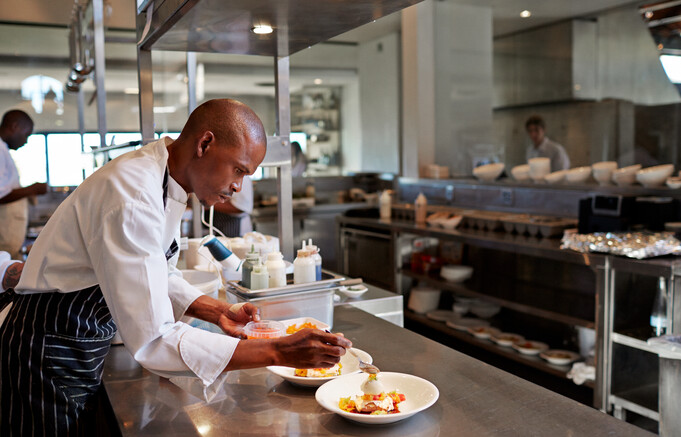Business communication skills for culinary professionals

If you're looking at careers in the culinary arts, you're probably well aware of all the cooking skills and food preparation techniques you'll need to know. However, you also need to know about effective business communication skills in the modern workplace, especially in the culinary world. This is because effective communication drives productivity and success, helping you and other team members work well together.
In this article, we'll go over why business communication skills are so vital in the culinary world and discuss specific communication skills that can help you improve your career prospects in this field. We'll also cover how you can develop your work communication skills to benefit your career prospects.
What are business communication skills?
Business communication skills are all about how to communicate effectively with people while you're in a professional setting. The non-business equivalent would be interpersonal communication. It means communicating with co-workers, team members, suppliers or other workers outside your organization and members of the public.
Communication skills include all types of communication, such as written, verbal and non-verbal cues.
Understanding business communication

Hispanolistic/E+ via getty images
Effective communication is vital to help any company work well towards its goals. Good communication can help projects or work assignments progress more smoothly, quickly and efficiently, making it a very important element in every workplace. It can also ensure team members, employees and members of the public feel respected and listened to, which can help make workplace interactions more effective. This means it is essential for you to build business communication skills to support your success in any type of career.
Business communication skills aren't static or the same in every situation. In fact, you'll want to adapt your communication methods to the context and current audience, using feedback to refine your approach. That’s why you should learn as much about different communication channels and techniques as possible.
The importance of business communication skills in the culinary industry
Communication is extremely important when you are working in the culinary arts. Culinary careers are fast-paced and the environment can be stressful thanks to how busy a professional kitchen can get. This means your communication needs to be clear, concise and delivered with precision to your target audience. It's also important because there can be health and safety risks in culinary workplaces and clear communication can help eliminate these.
Essential business communication skills for culinary professionals
It's worth learning all you can about the many varieties of communication. There are occasions when you might use different communication, but some of the essential skills include:
Verbal communication skills
Verbal communication skills for business interactions are all about talking and listening. This is the basis for a lot of workplace communication and you need to ensure clear and concise communication in a fast-paced culinary environment.
Active listening
Active listening is a huge part of making sure people feel listened to and understood. This is vital when you're communicating with team members. It involves:
- Not reading something or getting distracted while someone talks to you
- Nodding or using other body language to show you're listening
- Repeating back phrases to the speaker or asking questions to confirm you have understood
Clear and concise speaking
In a busy kitchen or restaurant, you need to make sure your messages are clear and concise. Some tips to help achieve good communication and presentation skills include:
- Know your audience and tailor your message to them
- Be specific and make your point quickly
- Use short sentences and a clear structure
- Avoid adding unnecessary words or phrases
- Check everyone has understood
Developing verbal communication skills for culinary professionals
Developing verbal skills can help you overcome communication barriers with your team. The best way to do this is through practice and accepting constructive criticism about your communication approach. You'll also be able to build these skills when you study for a culinary arts degree at an acclaimed culinary school in France. Learning alongside other culinary students and working in professional internships will help you develop these skills.
World-class culinary education
Develop your skills in cuisine and communication with our bachelor's degree, which combines expert teaching with essential real-world experience to launch your career.
Written communication skills

Klaus Vedfelt/ Royalty-free via getty images
Written communication is also vital when you deal with your team, suppliers and others. Examples include:
Professional writing
You need to make sure your writing skills are good enough to be easily understood. Written communications could encompass anything from detailed recipes to instructions and memos or even writing to people outside the business. Some tips to avoid common mistakes are:
- Keep it brief and to the point
- Avoid repetition
- Make sure it sounds natural
- Proofread for accuracy
Email etiquette
Emails are also important for team or wider industry communication. When writing emails:
- Use a sensible and clear topic in the subject line
- Use bullet points when appropriate for easier reading
- Clearly state what readers need to do to respond
Enhancing written communication skills in a culinary role
Again, the best way to hone these skills is with practice. You can also find plenty of courses on professional writing that can help you compose messages that will be fully understood.
Non-verbal communication skills
Non-verbal communication is vital to help people understand the nuance and meaning of what you say or to help you communicate in loud settings, such as professional kitchens. Examples include:
Body language
Effective body language for professional communication means:
- Looking positive and confident, but not aggressive
- Having open body language so people know they can talk to you
- Learning any specific body language used at the place where you work. Some kitchens have customized body language or signals used when colleagues are unable to hear
Visual communication
Visual communication in business is important for helping people understand presentations and documents. This means creating visually appealing and engaging materials that supplement any written communications or spoken presentations. However, there is a balance to find between having useful visual aids and symbols or diagrams that seem simple or merely decorative.
Overcoming communication challenges in the culinary industry

Klaus Vedfelt/ Royalty-free via getty images
There are a few barriers in culinary communication and, if you want a successful chef career, you'll have to overcome these. They include:
- Language and cultural barriers
- Communicating in a high-pressure environment
- Dealing with customer feedback
- Emotional barriers when people are stressed, tired or angry
- Technological barriers if people are not familiar with technology-focused communication
Overcoming these barriers is vital to ensure good relationships, collaboration and interactions. Some tips for overcoming these barriers include:
- Stay calm and polite, no matter what
- Work on building rapport within your team to enable calm communication
- Build conflict resolution protocols and influencing skills to defuse situations
- For language or cultural barriers, see if anyone in your team has more knowledge of the language or culture to assist
- Ensure sure your team is familiar with any technology you want to use
- Develop your persuasion skills to help people work as a team
- Make sure you know the right priorities in time-sensitive communication
Building strong communication channels in the culinary industry
Some important chef skills include knowing how to build good communication channels to get the best from your team and kitchen staff.
Effective team communication
You can enhance communication within culinary teams for seamless coordination throughout different projects, which can help make everyone more efficient. If you are a head chef, consultant chef or executive chef, you'll also be in a position to implement efficient communication practices in the kitchen.
Collaboration with front-of-house staff
Frequent meetings and building trust with front-of-house staff can help foster strong relationships with waiting staff. This is vital, because both front-of-house and kitchen staff need to work together for a restaurant to run smoothly and it's vital to coordinate with front-of-house staff to provide excellent customer service.
Professional networking and industry communication
Networking skills are important for culinary professionals to build connections. These can be enhanced by attending culinary events, trade shows and conferences.
Internationally recognized culinary skills
Immerse yourself in the culinary arts and gain the communication and business management techniques essential for success in this fast-paced industry.
Culinary business communication: conclusion
Your business communications skill is vital in the culinary world. The industry is fast-paced and lively and you'll need to work on many different techniques, such as verbal communication, written and non-verbal communication skills. Communication is one of the many things you will learn in culinary school when studying for a career in the culinary industry. As well as learning cooking skills and business management skills, the communication and team management competencies you'll acquire will help you develop your career. If you're interested in reading more, you can find out more about culinary school or the difference between a chef and a cook in our other blogs.
Photo credits
Main image:
gahsoon/ E+ via gety images


